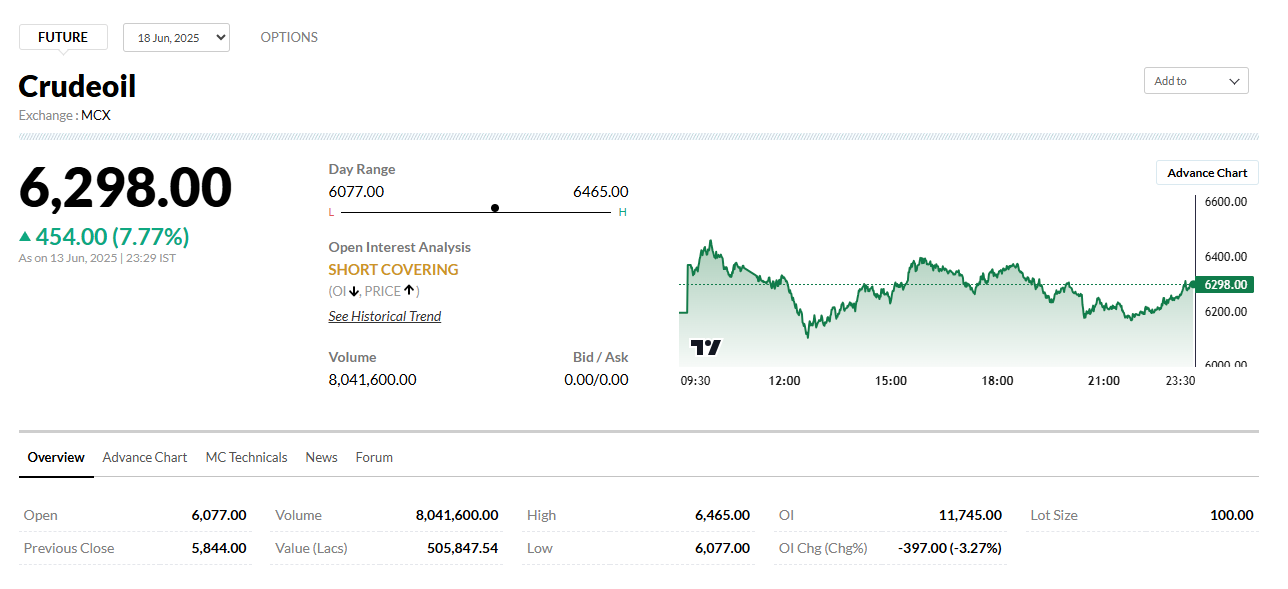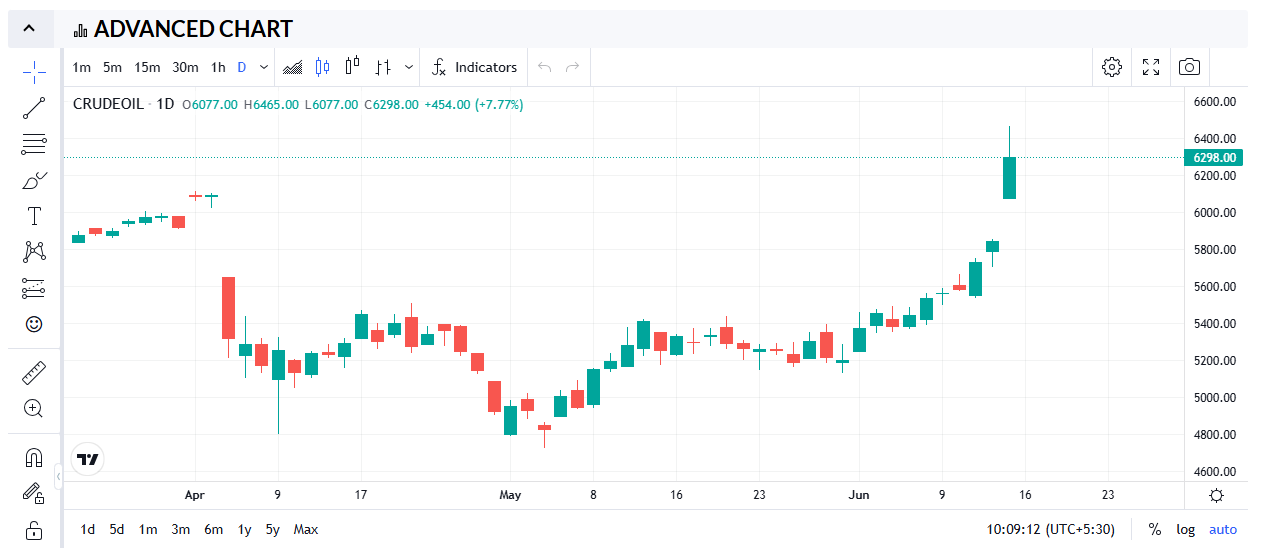
Introduction
The global crude oil market, already fragile from previous geopolitical strains, has been rocked by the latest developments in the Middle East. On June 14, 2025, tensions between Iran and Israel erupted into open conflict, sparking a surge in global oil prices. Brent crude oil and West Texas Intermediate (WTI) prices skyrocketed as fears of supply disruption spread rapidly through global markets.
This blog explores the intricate connection between Middle Eastern geopolitical tensions and oil prices, analyzing how events like the Iran-Israel conflict impact energy markets, supply chains, and global economies.
Brent Crude and WTI Prices Soar
The Surge
Brent crude oil futures jumped 7.02% to close at $74.23 per barrel, with intraday highs reaching $78.50 — a level not seen since January 27, 2025. Over the week, Brent crude prices soared by 12.5%.
WTI crude followed a similar path, ending the session up 7.26% at $72.98 per barrel, after climbing as much as 14% intraday to $77.62 — the highest since January 21. For the week, WTI surged by 13%.

The Brent crude price is a key benchmark for global oil markets, influencing the brent oil price and the broader cost of crude oil worldwide. Traders and investors closely monitor the crude oil price today to gauge market trends, while the brent crude oil price live provides real-time updates for decision-making. Fluctuations in Brent crude can impact everything from fuel costs to inflation, making it a critical indicator for economies and industries. Geopolitical events, supply-demand dynamics, and economic data often drive volatility in these prices, shaping energy markets and financial strategies. Stay updated on Brent crude trends to understand their far-reaching
Trigger: Escalating Iran-Israel Conflict
The immediate trigger was Israel's announcement of a strategic military operation targeting Iran's nuclear infrastructure and missile factories. Iran responded by launching missiles into Tel Aviv, escalating fears of prolonged regional conflict.

Military Operations
- Israel struck Iran's nuclear facilities and military leaders.
- Iran retaliated with missile strikes on Israeli cities.
These actions disrupted investor confidence and sent oil markets into panic due to the risk of a supply choke in the region. also read our recent blog on investment return story on jsw steel
Supply Concerns: Strait of Hormuz and OPEC Capacity
Strategic Importance of the Strait of Hormuz
About 20% of the world’s crude oil supply passes through the Strait of Hormuz — the narrow maritime passage between the Persian Gulf and the Gulf of Oman. Disruption here could create severe supply constraints.
Iran’s Oil Production
Iran produces about 3.3 million barrels per day (bpd) and exports more than 2 million bpd. Even partial disruptions could have cascading effects across:
- brent blend price
- cost of brent crude
OPEC’s Spare Capacity
According to Reuters, OPEC and allies, including Russia, may have enough spare capacity to cover Iran’s production if disruptions occur. However, doing so would deplete global reserves and spike prices further.
Historical Context: Echoes of the Ukraine-Russia Crisis
This isn't the first time crude oil markets have reacted sharply to geopolitical tensions. In 2022, Russia’s invasion of Ukraine led to historic price volatility. The current Israel-Iran conflict has triggered the largest intraday oil price movement since 2022, indicating the market’s vulnerability to regional flare-ups.
Market Comparisons:
- Brent oil prices surged 13% in a single day.
- WTI crude oil prices jumped by 14%, reminiscent of early 2022 price behavior.
Economic Impact: From Gas Pumps to Inflation
Global Economic Ramifications
As oil is a major input for transportation, manufacturing, and electricity, a spike in crude oil prices has a ripple effect:
- Higher fuel prices
- Increased transportation costs
- Inflationary pressure across sectors
Countries reliant on oil imports like India are particularly vulnerable to price hikes. The sudden rise in:
- brent crude oil rate
- crude oil share price
- petroleum price can raise domestic fuel costs and hurt household budgets.
Live Market Data Affected:
- brent crude price live today
- crude oil price today live
- brent crude oil price
Investor Reactions and Market Volatility
Commodities and Equities
Oil stocks surged while global equity markets dipped as investors moved assets to safe havens. Commodity traders saw massive inflows into crude oil contracts, with both brent and wti crude oil prices turning highly volatile.
MCX and Dollar Trades
India’s MCX crude oil price showed an uptick due to foreign inflows, and the live crude oil price in dollar terms also moved significantly.
What’s Next? Potential Scenarios
Scenario 1: Extended Conflict
If hostilities persist, expect continued volatility in:
- brent crude price live
- crude price
- oil rate today This scenario may force OPEC to ramp up production while consuming countries tap into strategic reserves.
Scenario 2: Diplomatic De-escalation
A quick ceasefire could stabilize oil prices. However, geopolitical risk premiums would likely remain elevated for weeks.
How Traders and Businesses Should Respond
Traders
- Monitor crude oil news today for quick decision-making.
- Focus on crude oil futures and options for hedging.
Businesses
- Evaluate supply chain risks, especially fuel-dependent operations.
- Adjust pricing strategies for transportation and logistics.
Investors
- Keep a close eye on crude oil share price and related ETFs.
- Diversify holdings to offset risk in volatile energy sectors.
Final Thoughts: A Fragile Balance
The Israel-Iran conflict is a stark reminder of how geopolitics can dominate energy markets. Crude oil, being the lifeblood of global economic activity, is extremely sensitive to conflicts, particularly in oil-rich regions like the Middle East.
As events unfold, staying informed is critical. Whether you're a trader, investor, policymaker, or consumer, understanding the impact of geopolitical tensions on:
- brent sea crude price
- crude price today
- oil news today can help make smarter, timely decisions.
Stay Updated
Bookmark our gopocket page and open a demat account with us to trade on commodities

Disclaimer: This blog is for informational purposes only. Market conditions are dynamic, and readers are advised to consult with certified financial professionals before making investment decisions.
"Investments in securities market are subject to market risks. Read all the related documents carefully before investing."
What's Trending
January 27, 2026
Recent Blog
Open Your Demat Account in Under 5 Minutes
Have any queries? Get support
Blog
Recent Blogs

Open your GoPocket Account within 5 minutes.
Have any queries?







.jpeg)

.jpeg)





